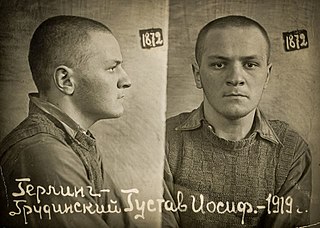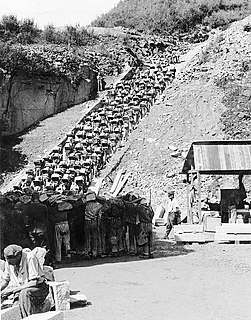Related Research Articles

The Gulag or GULAG was the government agency in charge of the Soviet network of forced labor camps set up by order of Vladimir Lenin, reaching its peak during Joseph Stalin's rule from the 1930s to the early 1950s. English-language speakers also use the word gulag to refer to all forced-labor camps that existed in the Soviet Union, including camps that existed in the post-Lenin era.

The Gulag Archipelago: An Experiment in Literary Investigation is a three-volume non-fiction text written between 1958 and 1968 by Russian writer and dissident Aleksandr Solzhenitsyn. It was first published in 1973, and translated into English, and French, the following year. It covers life in what is often known as the Gulag, the Soviet forced labour camp system, through a narrative constructed from various sources including reports, interviews, statements, diaries, legal documents, and Solzhenitsyn's own experience as a Gulag prisoner. In Russian, the term GULAG (ГУЛАГ) is an acronym for Main Directorate of Camps.
An Experimental Design Bureau, commonly known as a sharashka was an informal name for secret research and development laboratories operating from 1930 to the 1950s within the Soviet Gulag labor-camp system. Etymologically, the word sharashka derives from a Russian slang expression sharashkina kontora, an ironic, derogatory term to denote a poorly-organized, impromptu, or bluffing organization.
Article 58 of the Russian SFSR Penal Code was put in force on 25 February 1927 to arrest those suspected of counter-revolutionary activities. It was revised several times. In particular, its Article 58-1 was updated by the listed sub-articles and put in force on 8 June 1934.

The Solovki special camp, was set up in 1923 on the Solovetsky Islands in the White Sea as a remote and inaccessible place of detention, primarily intended for socialist opponents of Soviet Russia's new Bolshevik regime. The first book on Gulag, namely, In the Claws of the GPU (1934) by Francišak Aljachnovič, described the Solovki prison camp.

Kolyma is a region located in the Russian Far East. It is bounded to the north by the East Siberian Sea and the Arctic Ocean, and by the Sea of Okhotsk to the south. The region gets its name from the Kolyma River and mountain range, parts of which were not discovered by Russians until 1926. Today the region consists roughly of the Chukotka Autonomous Okrug and the Magadan Oblast.

Gustaw Herling-Grudziński was a Polish writer, journalist, essayist, World War II underground fighter, and political dissident abroad during the communist system in Poland. He is best known for writing a personal account of life in the Soviet Gulag entitled A World Apart, first published in 1951 in London.

Dubno is a city located on the Ikva River in Rivne Oblast (province) of western Ukraine. Serving as the administrative center of Dubno Raion (district), Dubno is incorporated as a city of oblast significance and does not belong to the raion. The city is located on intersection of two major European routes E40 and E85. Population: 37,464 (2020 est.) It is located within the historic region of Volhynia.

Extermination through labour was the practice in concentration camps in Nazi Germany of killing prisoners by means of forced labour. As part of the Holocaust, forced labour served a dual purpose: providing useful work to the Nazis, and killing prisoners who would otherwise have to be killed by other methods. It was a cruel twist of the phrase Arbeit macht frei "Work sets you free", which was emblazoned on the gates of multiple concentration camps. The work was designed to be absolutely destroying. Concentration camp inmates worked up to 12 hours a day with very little food, clothing, or medical care; the average labourer died after 4 months.

Anatoly Tikhonovich Marchenko was a Soviet dissident, author, and human rights campaigner, who became one of the first two recipients of the Sakharov Prize for Freedom of Thought of the European Parliament when it was awarded to him posthumously in 1988.
Danylo Lavrentiyovych Shumuk was a Ukrainian political activist who served a total of 42 years imprisoned by three different states, Second Polish Republic, Nazi Germany and Soviet Union.
The Main Administration for Affairs of Prisoners of War and Internees was an NKVD department in charge of handling of foreign civilian internees and prisoners of war (POWs) in the Soviet Union during and in the aftermath of World War II (1939–1953).

The anti-communist resistance in Poland, also referred to as the Polish anti-Communist insurrection fought between 1944 and 1946, was an armed struggle by the Polish Underground against the Soviet takeover of Poland at the end of World War II in Europe. The guerrilla warfare conducted by the resistance movement formed during the war, included an array of military attacks launched against Communist prisons, state security offices, detention facilities for political prisoners, and prison camps set up across the country by the Stalinist authorities.

The Way Back is a 2010 American survival film directed by Peter Weir, from a screenplay by Weir and Keith Clarke. The film is inspired by The Long Walk (1956), the memoir by former Polish prisoner of war Sławomir Rawicz, who claimed to have escaped from a Soviet Gulag and walked 4,000 miles (6,400 km) to freedom in World War II. The film stars Jim Sturgess, Colin Farrell, Ed Harris, and Saoirse Ronan, with Alexandru Potocean, Sebastian Urzendowsky, Gustaf Skarsgård, Dragoș Bucur and Mark Strong.

Juliusz Bardach was a Polish legal historian. Professor of the University of Warsaw, member of the Polish Academy of Sciences. He specialized in the history of governance and law of Lithuania and Poland.

Janusz Bardach was a gulag survivor, author, and noted plastic surgeon. He was the younger brother of Polish legal scholar Juliusz Bardach. Survivors include: his wife, Phyllis Harper- Bardach of Iowa City, Iowa; his daughter, Ewa Bardach and her husband Hani Elkadi of Iowa City; his granddaughter, Nina Elkadi of Iowa City.
Art and culture took on a variety of forms in the forced labor camps of the Gulag system that existed across the Soviet Union during the first half of the twentieth century. Theater, music, visual art, and literature played a role in camp life for many of the millions of prisoners who passed through the Gulag system. Some creative endeavors were initiated and executed by prisoners themselves, while others were overseen by the camp administration. Some projects benefited from prisoners who had been professional artists; others were organized by amateurs. The robust presence of the arts in the Gulag camps is a testament to the resourcefulness and resilience of prisoners there, many of whom derived material benefits and psychological comfort from their involvement in artistic projects.

Yertsevo is a rural locality in Konoshsky District of Arkhangelsk Oblast, Russia, located west of Lake Vozhe. Population: 4,201 (2010 Census); 4,013 (2002 Census); 4,683 (1989 Census).
The People's Commissariat for Internal Affairs, abbreviated NKVD, was the interior ministry of the Soviet Union.

Gulag Boss: A Soviet Memoir is a 2011 memoir by Fyodor Vasilevich Mochulsky (1918–1999), a Soviet Engineer and eventual Head of numerous Gulag camps in the northern Russian region of Pechorlag, Pechora, from 1940 to 1946. Under the orders of the Central Committee of the Communist Party of the Soviet Union (CPSU), Mochulsky oversaw the construction of a 500 km-long rail line from the Pechorlag camps, bordering the Arctic Circle, to central Russia, with a goal to connect "remote Pechora Camps to the outside world". The book was published posthumously by the Oxford University Press in 2011. It is introduced as well as translated and edited by sociology scholar, Deborah A. Kaple.
References
- ↑ Bardach, Janusz; Gleeson, Kathleen (1999). Man Is Wolf to Man: Surviving the Gulag. University of California Press. ISBN 978-0-520-22152-9.
- ↑ Goldberg, NY Times [ permanent dead link ]